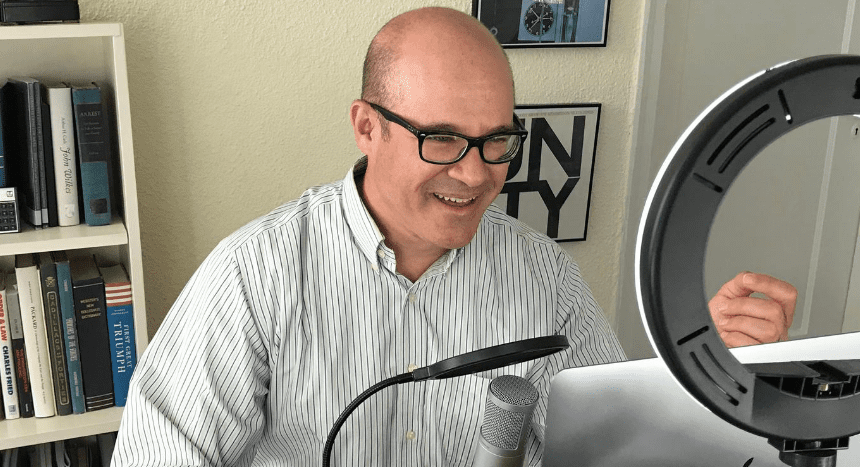
By Gwyneth K. Shaw
A few weeks into the academic isolation forced by the global coronavirus pandemic, Berkeley Law Professor Orin Kerr realized he missed talking to his colleagues. So Kerr — already a prolific scholar, popular teacher, well-known blogger, and ardent Twitter user — decided to add another title: podcaster.
“I missed the connection of talking to people, and I missed the interaction with my great colleagues, those off-hand conversations in the hallways,” says Kerr, who has been home with his family since in-person classes ended in March.
The startup costs were zero: He was already using Zoom to teach and attend faculty meetings and seminars. Why not just record a session in his home office? And, it turned out, his fellow law professors’ schedules had some free slots, too.
The result of his upstart project, “The Legal Academy,” launched in late May. Each episode features a prominent law professor, including Yale’s Akhil Amar, Columbia’s Jamal Greene, and Stanford’s Pam Karlan, and runs just under an hour. They’re freewheeling, honest conversations about the world of law professors, covering everything from how to fit teaching, writing, and practical legal work together to the things junior scholars should know about reaching the lofty goal of earning tenure.
A virtual faculty lounge
“Imagine the best conversation you could have encountering a colleague in the faculty lounge and all the things you’d want to ask a really informed law professor about being a law professor,” Kerr says. “That’s what I’m going for. Each week I get to ask whatever’s on my mind of these top people and it’s been wonderful — super interesting and a lot of fun.”
The big goal is to demystify the role of the law professor, so that law students, aspiring academics, and the public can peek behind the curtain of the ivory tower.
“A lot of the law professor world is hidden knowledge: How to write scholarship, how to think about hiring, how to think about teaching service obligations, being a dean. All these things are what professors will talk about one-on-one, but you can’t really find that out in public,” Kerr says. “There’s a lot of information out there about how to get an entry-level job. But there’s very little on the perspective of schools hiring entry levels and just the kind of sociology of being a law professor, what is our world, and how do we think about things and faculty dynamics and how we do what we do.
“I thought, let’s democratize that.”
Widespread influence
“The Legal Academy” further raises Kerr’s profile on social media and other non-academic sources, which he’s twinned with his prominent scholarly work for much of his career. His research articles have been cited more than 3,000 times in other academic papers and more than 300 times in court opinions, ranking him fifth on HeinOnline’s list of frequently cited legal scholars.
Much of Kerr’s research focuses on computer crime, particularly the intersection of the 4th Amendment and modern technology. But his article on how to read a legal opinion, aimed at new law students, has been downloaded more than 50,000 times from the SSRN repository, and his tongue-in-cheek piece “A Theory of Law” has worked its way into judicial opinions, too.
Kerr, who joined the Berkeley Law faculty last year after appointments at George Washington and Southern California, began blogging at the libertarian-leaning blog The Volokh Conspiracy in 2002. He quickly realized blogging, then in its heyday, was a great way to reach an audience of non-academics who could actually use his research for policy discussions.
“A lot of the work I do is public law: It’s about what the courts are doing, what Congress is doing, that ongoing evolution in the law,” he says. “That makes having a role in what’s happening right now an important part of my scholarly work. When I tweet or write a blog post about a new case, there are people following the field who are using that to learn about the new cases.”
Then, people stopped reading blogs and started reading Twitter. So Kerr made the move, too, in 2013. He now has more than 80,000 followers.
Into the arena
“There was a conversation happening that I wasn’t a part of and so it was consistent with my academic mission,” he says. “I think it’s a mixed bag. It can be an incredible waste of time, and there are aspects of Twitter that bring out the worst in people.
“Two hundred and eighty characters is just enough space to insult someone and not enough space to make an argument. So it’s not a great platform for debate.”
Twitter has also drawn Kerr into a realm he had largely avoided, at least publicly: politics. He’s one of the 14 founding members of the anti-President Donald Trump group Checks and Balances, conservative and libertarian attorneys who banded together to promote “a government of laws, not men.” Washington, D.C., power lawyer George T. Conway III, former U.S. Homeland Security Secretary Tom Ridge, and former Federal Election Commission Chairman Trevor Potter are among the other members.
Kerr says he’d prefer not to talk about politics, and looks forward to the day when he won’t have to anymore. Until then, he feels compelled.
“What I’m doing is a blend of my academic interests and ranting about the Trump Administration, and I wish we were in a world where I could only talk about the former — that’s what I kind of wanted to do on Twitter. I never blogged about politics,” he says. “But it’s the issue of our day and it seems like when you have a voice you should speak.”